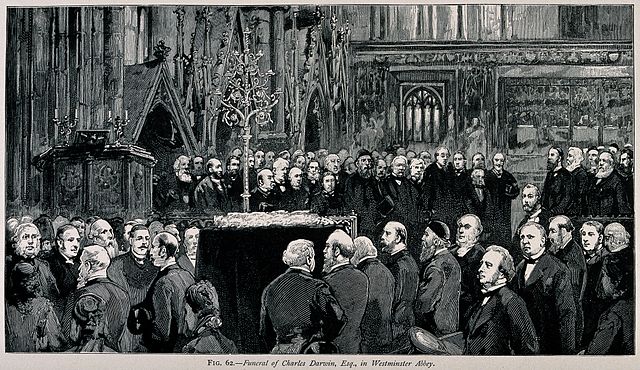
In part 1, I explained that to commemorate the 134th anniversary of Darwin’s funeral in Westminster Abbey, April 26, 1882, I thought that I’d say a little about each of the ten men who carried the coffin. (By the way, it was the second of Darwin’s coffins! John Lewis, a carpenter in Downe whom Darwin often employed, constructed a coffin “just as he wanted it; all rough, just as it left the bench, no polish, no nothin.” But the body stayed in it for not much more than a day, when it was transferred to a fancy polished coffin from the Abbey. A recent author—Iain McCalman in his Darwin’s Armada [2009]—quotes the description from Lewis but overlooks the fact that Darwin was buried in a different coffin.) Proceeding in alphabetical order (for no particular reason other than a sense of tidiness), then, I discussed George John Douglas Campbell, 8th Duke of Argyll; William Cavendish, 7th Duke of Devonshire; Frederic William Farrar; and—finally a more familiar pair of names!—Joseph Dalton Hooker and Thomas Henry Huxley. Onward!
James Russell Lowell (1819–1891). Often misidentified as the American Ambassador to Britain, Lowell was in fact the Envoy Extraordinary and Minister Plenipotentiary to the Court of St. James. (The distinction is now obsolete, but then ambassadors represented the head of state as well as the government, while envoys represented only the government.) Educated at Harvard University and Harvard Law School, Lowell was a poet (“The Present Crisis” is perhaps his most famous work) and essayist. He eventually became a professor of literature at Harvard (succeeding his friend Henry Wadsworth Longfellow), the first editor of The Atlantic Monthly, and a coeditor of the North American Review. After supporting Rutherford B. Hayes for president in 1876, he was rewarded with a diplomatic post in Spain, followed in 1880 by his post in England. In 1878, he wrote to Sara Darwin (the wife of Darwin’s eldest son), “I have a great respect for Mr. Darwin, as almost the only perfectly disinterested lover of truth I ever encountered.”
Sir John Lubbock, 1st Baron Avery (1834–1913). As a child, Lubbock was tantalized to be told of a “great piece of news” but disappointed to learn that it was that Darwin was moving nearby: he was hoping for a pony. Still, he befriended Darwin. He studied at Eton before joining his father’s bank; he later went into politics, with the promotion of science education as one of his main concerns. Scientifically, he was particularly interested in archeology and human prehistory—his first book was Pre-Historic Times, As Illustrated by Ancient Remains, and the Manners and Customs of Modern Savages (1865)—and entomology. He lived close to Darwin for much of his life; Darwin’s famous Sandwalk was in a woodland planted in a pasture rented, and eventually bought, from Lubbock. Lubbock was the first signer of the letter to the Dean of Westminster Abbey suggesting Darwin’s burial there. He was raised to the peerage in 1900, taking the title Baron Avery in honor of a Stone Age archaeological site he helped to preserve.
William Spottiswoode (1825–1883). Educated at Eton, Harrow, and Balliol College of Oxford University, Spottiswoode was a mathematician, experimental physicist, and printer—his father cofounded the firm of Eyre & Spottiswoode, and he eventually became a partner in the firm. He was elected as a Fellow of the Royal Society in 1853 and as its president in 1878; it is probably in his capacity as its president that he was among Darwin’s pallbearers. But he evidently admired Darwin. In a eulogy he delivered at the Royal Academy a few days later, on April 29, 1882, Spottiswoode extolled Darwin thus: “if patience and perseverance in good work, if a firm determination to turn neither to the right hand nor to the left, either for glory or for gain, if a continual overcoming of evil with good in any way constitute elements of greatness, then the man of whom I speak—Charles Darwin—was truly great.” In the following year, Spottiswoode died of typhoid fever; like Darwin, he was buried in Westminster Abbey.
Edward Henry Stanley, 15th Earl of Derby (1826–1893). Son of a three-time prime minister, born to one of the richest landowning families in England, and educated at Eton, Rugby, and Trinity College of Cambridge University, Stanley (known as Lord Stanley before acceding to the earldom in 1869) gravitated toward politics, serving as the Secretary of State for Foreign Affairs in the cabinets headed by his father the 14th Earl of Derby and Benjamin Disraeli. There are a variety of tangential connections between him and Darwin—he sacked Robert FitzRoy, formerly the captain of HMS Beagle, from his governorship of New Zealand in 1845; he was a family trustee of the British Museum and as such was assiduously courted by Darwin’s sometime nemesis Richard Owen; and his naturalist grandfather (Edward Smith Stanley, the 13th Earl) supported Darwin’s application for a grant for publishing the zoological results of the Beagle voyage—but it’s not clear to me why, besides his prominence, he was chosen to be a pallbearer.
Alfred Russel Wallace (1823–1913). Like Huxley, Wallace was talented but impoverished and as a result largely self-educated. Instead of joining the Royal Navy, though, Wallace saw the world by becoming a private zoological collector in Brazil and later the East Indies. He started to publish scientific papers and books and to correspond with naturalists—including Darwin, to whom he sent a paper outlining his ideas on natural selection in 1858, which chimed remarkably with unpublished ideas of Darwin’s. Darwin’s friends arranged for Wallace’s paper and extracts from Darwin’s 1844 essay to be presented in 1858, with the Origin following in 1859. Wallace never expressed bitterness about the incident, dedicating The Malay Archipelago (1869) to Darwin and entitling his 1889 book on natural selection Darwinism. Independently of his work on natural selection, Wallace was a remarkably prolific and productive scientist; he is generally considered the father of biogeography.

